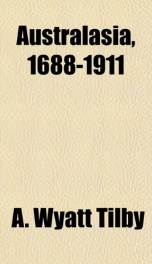australasia 1688 1911

Purchase of this book includes free trial access to www.million-books.com where you can read more than a million books for free. This is an OCR edition with typos. Excerpt from book: CHAPTER III THE PENAL STATIONS: 1788-1802i As Captain Cook sailed from place to place on his voyages of discovery in the southern seas, he claimed each spot at which he touched for Britain. In consequence, practically the whole of Australasia came into the nominal possession of England ;2 and lands whose very size and shape were still unknown, whose products and fertility could hardly be estimated, whose languages and peoples could not be enumerated, were henceforth considered to be subject to George in. That monarch had lately lost one empire in America by his own act; he now gained another in Australia by the acts of his lieutenants. The curious ethical conceptions of right which underlaythese claims to land that was already partially occupied, and therefore necessarily to some extent owned, by others, might perhaps have caused a transient feeling of amazement in a different planet, whose inhabitants were not subtle enough to disguise the happy belief that desire is a justification of possession under the spreading mantle of international law; but the practice was too common to excite much remark in the civilised countries of Europe. 1 There are many histories of early Australia. Auckland's History of New Holland (1787) deals with precolonisation times. Paterson's History of New South Wales may be consulted, as also Mudie's Picture of Australia, and Lycett's Views in Avstralia. For early days the Voyage of Governor Phillip (1790), White's Journal of a Voyage (1790), and Tench's valuable Narrative of the Expedition (1789); also Hunter's Historical Journal of Transactions at Port Jackson (1793), and Marsden's Present State of New South Walea. The various Voyages and Narratives published under the name of Barrington are not original. The best and fullest accounts of the...
Info about the book
Author:
Series:
Unknown
ISBN:
0710205163
Rating:
5/5 (2)Your rating:
0/5
Languge:
English
Users who have this book
Users who want this book
What readers are saying
What do you think? Write your own comment on this book!
write a commentif you like australasia 1688 1911 try:
Other books by this author
Do you want to read a book that interests you? It’s EASY!
Create an account and send a request for reading to other users on the Webpage of the book!




